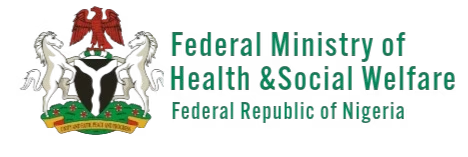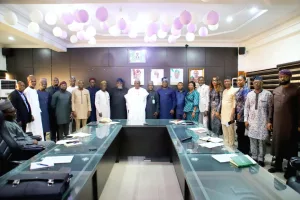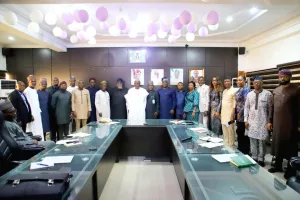Your Excellency the Coordinating Minister of the Economy and Minister of Finance, my brother the Honourable Minister of Budget and Economic Planning, my brother the Minister of State for Health, the Permanent Secretary, our Royal Fathers, the Special Adviser to the President on Health, the Special Adviser on Public Health, our development partners, Honourable Commissioners, senior government officials and heads of agencies, I stand on the already established protocols.
Years and years from now, when the story of this period is written, I have no doubt that the leadership of President Bola Ahmed Tinubu at this critical moment in our history will stand as one of its most glorious chapters. I say this because of the incredible vision he has laid down and because of how that vision is being translated into reality. From the two Coordinating Ministers to my colleague, His Excellency the Minister of Budget and Economic Planning, it is clear where this country is headed.
I also wish to acknowledge the quality of leadership that you, the President’s lieutenants, have demonstrated. It is one of his greatest strengths, his ability to select capable and disciplined leaders who have helped steer the country through difficult times to where we stand today. On behalf of all of us in the health sector, the Federal Ministry, our colleagues in the States and our partners, I wish to express deep appreciation for your steadfast support and commitment under the guidance of Mr. President.
I also thank our Royal Fathers and traditional leaders whose wisdom and influence continue to shape health behaviour and community participation across the nation.
Thank you for being with us at this Joint Annual Health Sector Review.
Theme: All Hands, One Mission — Bringing Nigeria’s Health Sector to Light
This year’s theme captures both our collective aspiration and our shared responsibility. It underscores our unity of purpose across all stakeholders, federal, state and local governments, partners, private sector, communities, civil society and citizens, and the strength of our collaboration in pursuit of better health outcomes for all.
In a mixed health system such as ours, government alone cannot meet every health need. Achieving our aspirations demands a whole-of-government and whole-of-society approach, one that harnesses the strengths of the private sector, the capabilities of our development partners, the vibrancy of civil society, the blessings and guidance of traditional and religious institutions and the active participation of citizens.
The presence of His Eminence the Sultan of Sokoto and the President of the Christian Association of Nigeria is a powerful testament to that unity of purpose.
Bringing the Nigerian Health Sector to Light reminds us that transparency and accountability must define our progress. It challenges us to hold ourselves to the highest standards and to welcome the scrutiny of those we serve.
This year’s review builds on the baseline established last year. It serves as a crucial accountability tool allowing us to track progress, identify gaps and chart a unified course toward better health outcomes for every Nigerian. It will assess sector performance on key indicators and feature the signing of an updated Compact, now with an addendum that includes local government areas, private sector, traditional and religious leaders and civil society organizations.
As a result, the Compact, originally signed in the presence of His Excellency the President, will now be better positioned to drive our collective progress toward Universal Health Coverage.
Progress Under the Health Sector Renewal Compact
Now to the good news, because there is much good news.
Under the Health Sector Renewal Investment and Sector-Wide Approach commitments, 84 percent of our key performance indicators under the Presidential Bond have been achieved as of the third quarter of 2025, that is 37 out of 41.
Thirty-five of the 36 states, plus the FCT, have conducted their State Joint Annual Reviews and State Performance Dialogues with active citizen participation in sectoral decision-making. Early this morning, I received a photograph of the Governor of Jigawa State in his office at 1 a.m., presiding over the State Health Sector Review, proof of how deeply states have embraced the spirit of the Compact.
All 36 states and the FCT now have Annual Operational Plans fully aligned with the National Health Sector Strategic Blueprint and its priorities.
Seventy-two percent of states have established functional Non-Communicable Disease Coordination Mechanisms to address hypertension, diabetes and other NCDs.
All 774 Local Government Areas now have National Health Fellows and Public Financial Management Officers, surpassing our targets.
All ministerial oversight meetings have been held, and 60 percent of the historical National Council on Health resolutions have been implemented.
These outcomes demonstrate that the Compact’s commitments were not mere words on paper. They have been translated into tangible actions at national, state and local levels. Nigeria is steadily transitioning from fragmented donor-led programming to coherent, nationally owned systems driven by measurable results.
Service Coverage and Utilization
Across reproductive, maternal, newborn and child health and primary health care indicators, the data shows consistent progress and expansion of service utilization throughout 2025.
According to quality-adjusted DHIS-2 data, the percentage of deliveries attended by skilled birth attendants now exceeds 90 percent, a remarkable improvement given where we began.
Routine HMIS data shows antenatal care coverage at 39 percent in 2023, while survey data recorded 52 percent. For 2024 and 2025, coverage levels have exceeded 50 percent in both years, showing that more women are attending antenatal clinics.
New family planning acceptors have increased steadily each quarter, with an overall 10 percent increase between the first and third quarters of 2025. Nearly half of women of reproductive age now use modern contraception, meeting previously unmet needs while respecting family, cultural and religious values.
Routine data also shows steady improvements in vaccination coverage for key antigens. Thanks to Gavi and other partners, we have achieved most of our targets for measles and rubella, while the introduction of the HPV vaccine stands as a beacon of progress globally.
Primary health care utilization in Basic Health Care Provision Fund facilities grew from 10 million visits in the first quarter of 2024 to 37 million in the first quarter of 2025 and 45 million in the second quarter of 2025. This demonstrates renewed public confidence in our primary health care system.
Outcomes and Impact
Maternal deaths have declined by 17 percent and newborn deaths by 12 percent across the 172 high-burden local government areas targeted under the Miyami model. These areas account for more than half of maternal deaths nationwide. By using good data to identify and focus on these LGAs, we are already seeing tangible results.
By 2026, population data from ongoing surveys will validate and deepen these gains, but what we are witnessing now is already proof of progress.
Fifty-two percent of these 172 LGAs now have at least two level-two primary health care facilities, and 435 facilities have been revitalized. Over 15,000 community-based health workers have been recruited across priority states, and nearly 70,000 frontline health workers have been retrained, moving us closer to our target of 120,000 by 2027.
Skilled birth attendance coverage has increased by 33 percent, and within the priority LGAs, 4,000 free caesarean sections have been conducted in NHIA-empanelled facilities. This follows the decision last year to include emergency obstetric care, including caesarean sections, under the national insurance benefit, removing one of the key barriers preventing women from accessing lifesaving care.
We have moved from faith-based policy to evidence-based programming.
Citizen Feedback and Accountability
In line with the President’s directive that our policies must respond to the needs and experiences of Nigerians, we conducted citizens’ perception surveys in 2023, 2024 and again in 2025. Thousands of Nigerians shared their experiences and expectations of the health system.
The findings are encouraging. The proportion of citizens who believe that government considers their views in health decision-making now stands at nearly half the population. Confidence in the overall direction of the health system has risen to 55 percent, while confidence in government’s capacity to manage health emergencies is now at 67 percent.
Patient satisfaction with healthcare facilities and primary healthcare services remains strong at 74 percent. This is a commendable result, given the challenges our system still faces.
However, citizens have clearly indicated that affordability remains a major concern. Access to services is improving, but affordability must improve further. I am pleased to note that, through the commitment of the Ministers of Finance and Budget, plans such as the Medical Relief Programme and expanded social health protection are underway to ease these pressures.
Health insurance coverage has also grown. Two years ago, it stood at around six to seven percent; today, it has reached 12 percent, driven by the implementation of mandatory health insurance and the operationalization of the Vulnerable Groups Fund.
These results show that the measures we have put in place to reduce fragmentation, improve coordination and enhance national ownership are beginning to yield real results.
Financing, Sustainability and the Road Ahead
Our task now is to consolidate the gains, sustain financing and continue expanding health insurance coverage, especially for the poor and vulnerable. We must strengthen the primary health care system, which remains the foundation of our journey to Universal Health Coverage.
We also thank the National Assembly, the Senate and the House of Representatives, for their unwavering oversight and support. Appropriations and releases of funds are increasingly reflecting in real sector performance, and we will continue to ensure that every naira invested in health translates into measurable outcomes for Nigerians.
To achieve our goals, we will advance the localization agenda, reducing dependency on external assistance by mobilizing domestic resources, boosting local manufacturing of medicines, vaccines and health technologies, and building resilient supply chains.
We must also ensure that state and local governments invest more in health, education, water, sanitation and nutrition, consistent with the President’s ward-based development approach, which is perhaps the most practical strategy for lifting communities across Nigeria.
We are also exploring innovative financing options such as fiscal measures on sugar-sweetened beverages, public private partnerships and digital solutions that enhance transparency and accountability in the use of health funds.
Human Resources for Health
Progress also depends on our people. In the last one year alone, more than 20,000 frontline health workers have been recruited into federal tertiary hospitals to fill longstanding gaps. Within the last few months, over fifty billion naira has been approved to address arrears, allowances and professional needs across cadres.
We are constructively engaging with health professional leaders to resolve long-standing issues responsibly. Our call to all health workers is simple: put the Nigerian person at the centre of attention. If we do that, all other issues can be resolved.
Closing
Let me thank all of you for joining us and contributing to this Joint Annual Review. I also thank my colleagues in the Federal Executive Council, members of the National Assembly, our State Commissioners, Local Government leaders, civil society and private sector partners who are here in full force.
Together, we are proving that Nigeria’s health transformation is not an aspiration; it is already in motion.
Under the leadership of President Bola Ahmed Tinubu, we are not merely reforming the health sector; we are restoring confidence, rebuilding systems and renewing hope for every Nigerian family.
Thank you.



